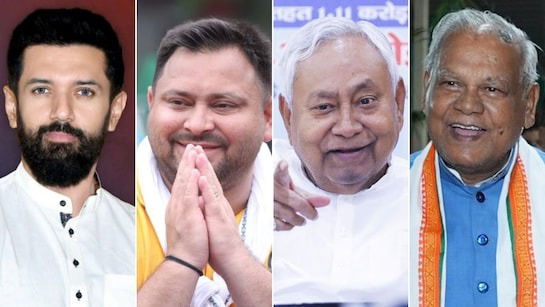
As the Bihar Assembly elections approach, the focus has shifted to the ongoing seat-sharing discussions between key political alliances. The National Democratic Alliance (NDA) and the Grand Alliance are both engaged in complex negotiations, but tensions are already surfacing as the final decision looms. Jitan Ram Manjhi, the leader of the Hindustani Awam Morcha (HAM), has made his party’s position clear, while Chirag Paswan of the Lok Janshakti Party (LJP) remains tight-lipped on the issue. The ongoing negotiations have intensified, with the BJP and Chirag Paswan at an impasse regarding the allocation of seats.
Jitan Ram Manjhi’s Demands for Party Recognition
Jitan Ram Manjhi, the leader of HAM, has warned that his party may consider boycotting the elections if their demands are ignored. He emphasized that HAM is not contesting over seat numbers but is demanding official recognition of the party in the Bihar Assembly. Manjhi clarified that the primary demand is to ensure adequate seats for his party to achieve this recognition. While HAM does not seek key political positions, such as the Chief Minister or Deputy Chief Minister posts, the focus remains on securing the necessary recognition for the party’s legitimacy in the assembly.
According to Manjhi, the issue is not about the number of seats but the recognition of his party’s role in the legislative process. The demand for official recognition has become a central point of contention as political parties continue to negotiate the distribution of assembly seats. Manjhi’s warning signals that the elections in Bihar could see significant disruptions if HAM’s concerns are not addressed adequately.
Chirag Paswan’s Silence and the LJP’s Seat Demands
On the other hand, Chirag Paswan, the leader of LJP, has remained silent on the seat-sharing issue, adding another layer of complexity to the ongoing negotiations. Sources suggest that while the BJP is reportedly willing to offer more than 20 seats to the LJP, Paswan has insisted on a higher number, specifically seeking 35 seats. The seat-sharing talks also involve discussions over a significant ministry position for LJP, along with representation in either the central or state legislature’s upper house.
The LJP’s seat demands also extend to specific constituencies where the party currently holds Lok Sabha seats. Paswan has reportedly requested two seats each in constituencies such as Vaishali, Hajipur, Samastipur, Khagaria, and Jamui. These constituencies are particularly important as they align with the LJP’s existing representation in the Lok Sabha. The request for these seats indicates the LJP’s focus on consolidating its position in areas where it already has a strong political presence.
Moreover, the issue of the Govindganj seat, which is currently held by a BJP MLA, has added to the tension. Raju Tiwari, the president of LJP(R), has expressed interest in this seat, further complicating the seat-sharing negotiations. The battle for key constituencies like Govindganj has become a point of contention between the BJP and LJP, with both parties vying for control over influential seats.
BJP’s Role in Resolving the Standoff
In response to the ongoing standoff with Chirag Paswan, senior BJP leaders, including Dharmendra Pradhan, Vinod Tawde, and Mangal Pandey, have reportedly met with Paswan in an effort to resolve the situation. These meetings indicate that the BJP is keen on addressing the seat-sharing impasse and moving forward with the alliance negotiations. However, the final decision on seat distribution is expected to follow guidance from the central government, which will likely have a significant influence on the party’s stance.
The BJP’s willingness to meet with Paswan suggests that they are trying to find a solution that satisfies all parties involved. However, with each side holding firm to their demands, the negotiations have become increasingly complicated. The outcome of these discussions will determine the political landscape in Bihar for the upcoming assembly elections, and the BJP is likely to play a crucial role in finalizing the seat-sharing agreement.
Alliance and Strategy Discussions Intensify Across Parties
As the seat-sharing negotiations continue, the broader picture of alliances and strategy for the Bihar Assembly elections is also evolving. Late on Wednesday night, Left leaders met with Tejashwi Yadav, the leader of the Rashtriya Janata Dal (RJD), to discuss potential alliance strategies. This indicates that the Grand Alliance is also actively pursuing discussions to solidify their position ahead of the elections.
Additionally, a Congress Working Committee (CWC) meeting has been scheduled for today in Delhi, further highlighting the acceleration of discussions between parties regarding alliances and election strategies. These developments suggest that both the NDA and the Grand Alliance are working diligently to finalize their respective strategies as the election date draws closer.
Challenges Ahead: Can Seat-Sharing Negotiations Be Resolved?
The ongoing seat-sharing negotiations have presented significant challenges for both the NDA and the Grand Alliance. Jitan Ram Manjhi’s demand for party recognition and Chirag Paswan’s insistence on a larger share of seats have created a stalemate in the discussions. Despite efforts by BJP leaders to resolve the situation, the negotiations remain complex and have yet to reach a conclusive resolution.
Moreover, the disagreements over specific constituencies and the allocation of key ministerial positions have added another layer of complexity to the negotiations. While the BJP and LJP continue to disagree on the number of seats and their respective roles in the government, both sides are under pressure to reach an agreement before the election campaign gains full momentum.
As the political temperature rises in Bihar, the coming days will be crucial in determining how the seat-sharing dispute is resolved. The outcome of these negotiations will have a significant impact on the alliances and strategies of both major political coalitions in the state.
The seat-sharing negotiations ahead of the Bihar Assembly elections are proving to be a pivotal moment in the state’s political landscape. With Jitan Ram Manjhi demanding recognition for his party and Chirag Paswan holding firm on his seat demands, the situation remains tense. As both the NDA and the Grand Alliance prepare for the election, the final seat-sharing agreement will likely determine the future direction of Bihar politics.
With discussions continuing at both the state and national levels, political leaders are under increasing pressure to finalize their strategies and reach a consensus. As the election approaches, the outcome of these negotiations will shape the course of the campaign and the future political dynamics in Bihar. The coming weeks will be critical in determining how these complex seat-sharing issues are resolved and whether a stable alliance can emerge in time for the elections.


